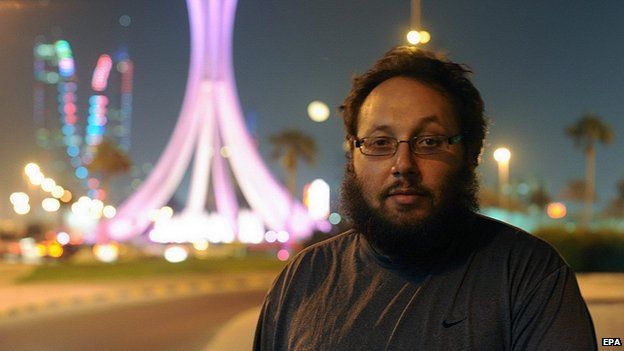Steven Sotloff: US journalist murdered by IS
- Published

Steven Sotloff is the second American journalist the jihadist group Islamic State (IS) has killed.
In a video published on 2 September, which has been confirmed as authentic by the US authorities, Mr Sotloff was shown dressed in an orange smock, his hands tied behind his back, kneeling in front of a masked figure holding a knife. He was then beheaded.
IS had threatened to kill Mr Sotloff at the end of a video released last month showing fellow American journalist James Foley being murdered.
US President Barack Obama denounced Mr Sotloff's murder as "a horrific act of violence" and insisted that the he would not be intimidated by IS.
"Whatever these murderers think they will achieve by killing innocent Americans like Steven, they have already failed," he said.
'Stand-up philosopher'
Mr Sotloff, 31, was abducted in northern Syria a year ago.
He is thought to have been kidnapped near the city of Aleppo, and to have been held in the IS stronghold of Raqqa.
Reports suggest his family initially did not publicly confirm his abduction because of official advice that no publicity would improve his chances of release.
The freelance journalist wrote for several publications, including Time magazine, Foreign Policy, the Christian Science Monitor and World Affairs Journal. He reported from countries including Egypt, Libya and Syria.
On his Twitter account, which has been inactive since 3 August 2013, Mr Sotloff described himself as a "stand-up philosopher from Miami".
He tweeted about current affairs in Syria, Libya, Egypt and Turkey - but also about his love for the Miami Heat basketball team.
'What he loved'
Mr Sotloff was Jewish and held dual US-Israeli citizenship. His mother Shirley is the daughter of Holocaust survivors, and he attended a Jewish school in Miami.
He later studied journalism at the University of Central Florida, where he also wrote for the student magazine.
Mr Sotloff developed a profound interest in and affection for the Middle East and its culture, travelling to Yemen to study Arabic.
According to an unnamed former hostage, Mr Sotloff hid his Jewish identity from his captors and even managed to fast on the Day of Atonement - the holiest day in the Jewish calendar.
Speaking to the Israeli newspaper Yedioth Ahronot, the unnamed former hostage said that Mr Sotloff "...told [his captors] that he was sick and didn't want to eat, even though they served us eggs that day".
Laura Kasinof of the New York Times tweeted: "Sotloff was brave and loved the Middle East and its people. Always hung out with Yemenis more than foreigners."
His friend Emerson Lotzia told the student magazine that journalism was "what he loved to do".
"Steve said it was scary over there. It was dangerous. It wasn't safe to be over there. He knew it. He kept going back," he said.
His articles also revealed his determination to report from the field, despite the potential risks.
In a 2013 report from Egypt, Mr Sotloff described his visit to a Muslim Brotherhood protest camp, despite his Egyptian friend's warning that he would be in danger there.
"After an hour of fruitless conversation over endless glasses of sweet tea, I rose, shook Ahmad's hand, and headed straight to the lair where he believed I would be devoured," he wrote.
'Thoughtful journalist'
He often focused on the human side of the conflict, writing about the plight of displaced civilians in Syria struggling without adequate food or shelter in early 2013.
In a report for Syria Deeply, Steven Sotloff wrote about the struggle of ordinary Syrians in the stricken city of Aleppo, and their increasing disillusion with the Western-backed rebel alliance, the Free Syrian Army (FSA):
"'These guys will do anything to win, even if it means destroying our youth,' says grocer Anwar Khuli, 51, throwing a disdainful look at a group of fighters buying munchkin size cups of coffee at a cafe nearby. 'They have already destroyed our country.'
"Sentiments like these reflect the disappointment that many of Aleppo's residents harbour towards a group that held so much promise for them when it first emerged.
"With each passing day, they say, their hopes are dashed by the reality that the FSA is a seriously flawed organisation. And with every gaffe and abuse, the lustre of Assad's tainted regime grows brighter."
Mr Sotloff also reported from Libya in 2012, reconstructing what happened the night the US consulate in Benghazi was attacked.
He argued that any US action following the attack should be done carefully, telling Fox News: "The Libyans are very grateful to the Americans for what they did last year during the revolution... it's really important it stays that way because Libya can be a very strong ally in the future."
Ann Marlowe, a writer who said she knew Mr Sotloff from his work in Libya, said that he "lived in Yemen for years, spoke good Arabic, deeply loved (the) Islamic world".
In a statement, World Affairs Journal described him as "an honest and thoughtful journalist" who tried "to understand the story from local perspectives".
It said he sought to "report his findings straightforwardly" and was "certainly courageous".